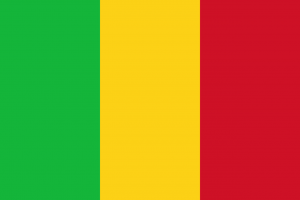Language/Bambara/Vocabulary/Health
Hi Bambara learners! 😊
In this lesson, you will learn Bambara vocabulary related to health. Health is an essential topic, and it is good to have a basic understanding of health problems and the appropriate vocabulary to express them. We will focus on medical conditions, injuries, and symptoms. Additionally, we will provide you with cultural information and interesting facts. So let's get started!
Finish this lesson and explore these related pages: Count to 10 & How to Say Hello and Greetings.
Common Medical Conditions[edit | edit source]
Medical conditions can happen to anyone at any time, and it is better to know them in Bambara.
| Bambara | Pronunciation | English |
|---|---|---|
| ninw bɛ̀ | neen duh | headache |
| kàntɔ̀n | kahn ton | toothache |
| ànwòtɛ́tɛ́ | an woh teh teh | stomachache |
| kɛ̀làtigi | kell ah tee gee | fever |
| bánàbànyà | bah nah bah n(y)ah | diarrhea |
| ɲɛ́lɛ́n-ɲɛ́ | nyeh len-nyeh | cold |
| kàstɛ̀-kàstɛ̀ | kahs teh-kahs teh | cough |
Dialogue:
- Person 1: N kàntɔ̀n i wórɔ kɛ̀nɛ̀w? (Do you have a toothache?)
- Person 2: I kàntɔ̀n kà nà. (Yes, I have a toothache.)
Injuries[edit | edit source]
Sadly, injuries are part of life, and they can happen anytime, anywhere. Knowing the Bambara vocabulary associated with injuries can be helpful.
| Bambara | Pronunciation | English |
|---|---|---|
| sow bɛ̀ | so duh | Injury |
| bɔ̀gú bɛ̀ | boh goo duh | Bruise |
| gùhùlù kɛ̀nɛ̀ | goo hoo loo k(en)eh | Broken bone |
| kátɛ̀tɛ̀ kɛ̀nɛ̀ | kat(eh)-teh k(en)eh | Sprain |
| bɔ̀lɔ́bàyì | b(oh) loh bah yee | Bleeding |
Dialogue:
- Person 1: Mɔ́gɔ i sowbɛ̀ kà nà. (He has an injury.)
- Person 2: A sow bɛ̀ kà i n'àn (He is injured but not that bad.)
Symptoms[edit | edit source]
Symptoms are a manifestation of a particular disease, and Bambara has the appropriate vocabulary to express them.
| Bambara | Pronunciation | English |
|---|---|---|
| kɛ̀làtigi bɛ̀ | kell ah tee gee duh | Fever |
| kàntɔ̀n bɛ̀ | kahn ton duh | Toothache |
| kàstɛ̀-kàstɛ̀ bɛ̀ | kahs teh-kahs teh duh | Cough |
| ninw bɛ̀ | neen duh | Headache |
| kàbà bɛ̀ | kah bah duh | Vomiting |
| bɔ̀lɔ́bàyì bɛ̀ | b(oh) loh bah yee duh | Bleeding |
Dialogue:
- Person 1: Mɔ́gɔ i kɛ̀latigi bɛ̀ kà nà. (He has a fever.)
- Person 2: A kàn kàstɛ̀-kàstɛ̀ bɛ̀ wà. (He is coughing alot.)
Cultural Information[edit | edit source]
Medical traditions in Mali are very cultural and people still rely on traditional medicine. In Mali, medicine is viewed holistically as involving not only the body but also the mind and spirit. Some Malians will seek the help of healers known as "fétiches", who use natural remedies and traditions passed from generation to generation to cure diseases.
In Bambara culture, cow's milk is viewed as suitable for people who are ill. They believe it helps to heal people faster than any other medicines. Also, it is very common for people to visit a local stomatologist (dentist) for tooth pain.
If you are traveling to Mali for medical purposes, it is important to understand these local customs and beliefs to help you communicate better with healthcare providers.
Interesting Facts[edit | edit source]
- In Mali, the average person's life expectancy is around 60 years. - In Bambara culture, family is an essential part of life. It is common for families to live together in the same compound consisting of several huts or houses. - Mali has an excellent healthcare system for the local community. But if you are a foreigner traveling to Mali, it is advised to have travel insurance to cover your medical expenses.
To improve your Bambara Vocabulary, you can also use the Polyglot Club website. Find native speakers and ask them any questions!
➡ If you have any questions, please ask them in the comments section below.
➡ Feel free to edit this wiki page if you think it can be improved. 😎
Other Lessons[edit | edit source]
- How to Say Hello and Greetings
- Eat
- Colors
- Count to 10
- Education
- Drinks
- Useful phrases
- Drink
- Express Surprise
Sources[edit | edit source]

